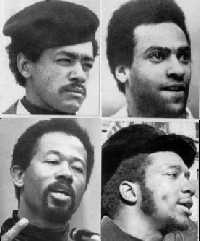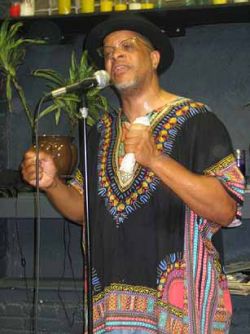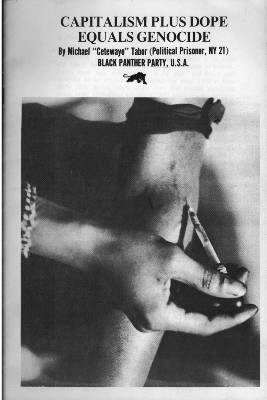|
Blog Feeds
Anti-Empire
The SakerIndymedia Ireland is a volunteer-run non-commercial open publishing website for local and international news, opinion & analysis, press releases and events. Its main objective is to enable the public to participate in reporting and analysis of the news and other important events and aspects of our daily lives and thereby give a voice to people.
Public InquiryInterested in maladministration. Estd. 2005
Human Rights in IrelandIndymedia Ireland is a volunteer-run non-commercial open publishing website for local and international news, opinion & analysis, press releases and events. Its main objective is to enable the public to participate in reporting and analysis of the news and other important events and aspects of our daily lives and thereby give a voice to people.
|
Former Black Panther to Speak in Dublin national |
anti-capitalism |
feature national |
anti-capitalism |
feature
 Monday February 02, 2009 08:50 Monday February 02, 2009 08:50 by Fin by Fin

The Anarchist Bookfair 2009 is being held in Liberty Hall on March 7th. This year, the Workers Solidarity Movement are proud to announce US Anarchist Ashanti Alston will be speaking. Ashanti was a member of the Black Panther Party in the 1960's and early 1970's. As a political prisoner he spent over a decade in US prisons. Ashanti has since become an anarchist while still drawing on many of his experiences and ideas that spurred him on as a Black Panther activist. In this interview Ashanti talks about his past, how he came to join the Panthers, what they achieved and how he views the current struggle. Audio links are highlighted and are bold.
Related Links:
Plainfield is a majority African American city in Union County, New Jersey. Growing up in a black neighbourhood in the racist climate of the US in the 1950's Ashanti was shaped and deeply affected by the everyday experience of degradation, humiliation and subjugation that was the black experience in the US. In 1967 the black community of Plainfield rose up against the US state. Using weapons stolen from a local arms factory the community armed itself, fought against the police and only defeated when the State sent in the National Guard who came in and brutalised the area with a vicious wave of repression. This uprising obviously had a massive impact on people in the area. Below Ashanti talks of growing up in the USA in the 1960's and experiencing the Plainfield uprising 
Huey P. Newton and Bobby Seale
In the late sixties the Black Panther Party achieved a large following. The real support in the communities they organised came from a very serious community programme they had and their willingness to physically confront the US state to defend communities when needed. They became so successful most notably through their breakfast programme – providing free breakfasts to children in African American neighbourhoods, and their willingness to stand up for their communities. They were called the "greatest threat to internal security" of the USA by Chief of the FBI – J.E. Hoover. Through their successes, the Black Panther Party were not just labelled a threat by the FBI, they were being treated as such. By 1968 they had become the main focus of COINTELPRO (an acronym for Counter Intelligence Program), a secret US state programme co-ordinated by the FBI which stated "maintaining the existing social and political order" as one of its goals. Through COINTELPRO the U.S. State went to war on the Panthers. This war infamously saw the assassination of Chicago Black Panther organiser Fred Hampton Jnr in 1969 whilst asleep in a bed, an attempt to create an internal civil war between Huey P Newton the (Minister for Defence) and Eldridge Cleaver (Minister for Propaganda). It also lead to the deaths of dozens of party activists and the incarceration of hundreds more. COINTELPRO would eventually win out over the Panthers destroying the party as an effective structure by the mid-seventies. Ashanti, when talking about the demise of the Panthers, whilst always laying the blame on the US states door, has noted that some internal problems within the Panthers allowed the FBI to manipulate the movement. Following on from these, Ashanti elaborated on the Panthers Attitude to Gender which was taken more seriously in the Panthers than in many other left wing groups. This is not to say sexism did not affect members. By the early 1970's Ashanti had gone underground with the Black Liberation Army and had been captured and imprisoned by the US State. During his time in prison Ashanti was exposed to anarchist ideas. During this period there was obviously much reflection on the Black Panthers and the problems they experienced around hierarchy and authoritarianism. The Panthers were an authoritarian organisation dominated by individuals such as Huey P Newton, Bobby Seale and Eldridge Cleaver. The movements of the 1960's and early 1970's can at times make the level of struggle in US and Europe at the moment seem inconsequential. However when I asked Ashanti this question he was Finally over the past three months, the topic everyone has been talking about in US politics is Obamamania. For the first time in a decade many people in Europe have a positive attitude to a US President but many on the left have remained skeptical. I was keen to ask Ashanti who is still a community activist in New Jersey what a Black President would do for the situation of Black Americans and the American working class in general. You can hear his response
More Information:
Ashanti Alston is speaking at the Dublin Anarchist Bookfair 2009 in Liberty Hall on March 7th.
|


























 printable version
printable version

 Digg this
Digg this del.icio.us
del.icio.us Furl
Furl Reddit
Reddit Technorati
Technorati Facebook
Facebook Gab
Gab Twitter
Twitter
View Full Comment Text
save preference
Comments (6 of 6)